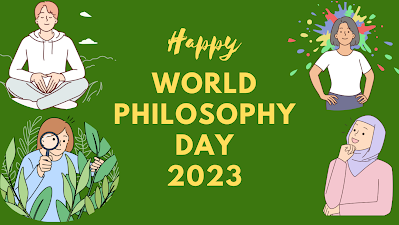This year, World Philosophy Day was for me an opportunity to bring to young people some philosophical reflections on how we make decisions, arrive at explanations, and interact with each other in challenging contexts.
In the morning I visited a primary school and talked to year 5 and 6 students about how we seek an explanation when something unexpected happens. We started by considering some definitions of philosophy and accounts of the value of philosophy ("What is philosophy for?") and then we watch two brief videos together.
The Ant and the Grasshopper is about how we tend to blame others (especially people and institutions we don't like) when we find ourselves in a crisis; and The Fox and the Owl is about how we often prefer to arrive at the solution of a problem by ourselves, without consulting with other people, even when they may have relevant knowledge to share.
In the discussion after watching the videos, children recognised in the various animal characters different styles in gathering evidence and in approaching opportunities for potential collaboration. They also observed how it is natural for us to seek a solution straight away, jumping to conclusions, when we are worried and stressed, and how attempting to solve a problem by ourselves might make us feel special but also means that we cannot rely on information that is only available to other people.
It was a wonderful experience to share ideas with the children and we ended with some reflections about what we should try and do, and try and avoid, when we are in the business of explaining unexpected events. Should you be interested in talking about this with your students or other young people in your life, I made my slides available here.
In the evening, I participated in a workshop sponsored by project EPIC (Epistemic Injustice in Healthcare) and facilitated by Mind in Camden. The other participants were young people from the Voice Collective. In the session I talked about a recent project where video-recorded interactions between practitioners and young people accessing mental health emergency services were analysed by an interdisciplinary team of academic researchers and a team of young researchers with lived experience, in collaboration with McPin.
I shared our findings in relation to how young people accessing services often found that they were seen as problems to be solved or as collections of symptoms waiting for a diagnostic label as opposed to whole persons with a multiplicity of potentially conflicting and complex needs and interests. (This podcast addresses the main findings of the project if you want to know more.)
The young people from the Voice Collective participating in the workshop shared their own positive and negative experiences with mental healthcare professionals. One of the many interesting contributions the young people made was to acknowledge that a diagnosis is sometimes helpful, but too often it is a label they received without the practitioners first exploring the young people's experiences. And once the diagnosis was written in their medical notes, all future encounters with practitioners were coloured by it, even years after the original meeting, when the young person's concerns and interests had considerably changed.
I am not sure what philosophy can bring to these important conversations, apart from offering some concepts that can help think about these experiences in a new way and potentially inform our attempts to improve our mutual interactions by putting other people's agency first.


